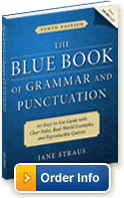|
Welcome to your GrammarBook.com E-Newsletter.

|
"Thank you for authoring the wonderful Blue Book of Grammar and Punctuation."
- Eleanor M.
"I 'd like to thank you from the bottom of my heart. I am an Afghan and English is my second language. English grammar is challenging; your guidance will help me very much."
- Maliha K.
"I am a court reporter and I find your quizzes very helpful!"
- Joanne S.
|
|
|
The Word Nerd: 6 Pitfalls Writers (And Others) Should Avoid
I often receive comments from concerned readers about what they see as "deterioration of the English language." In that vein, I hope you will enjoy this week's entertaining and informative article from veteran copy editor and word nerd Tom Stern. As always, if you would like to comment on today's article, please feel free to write in using the "Grammar Blog" tab, or click here GrammarBook.com/blog/.
That’s right, I admit it. I’m a word nerd. I pick, pick, pick at the way you express yourself.
Despite protests of apathy, people of all ages care about how well they express themselves. Deep down, everyone likes to be right about language, and you can even hear little kids teasing each other about talking funny. We word nerds have an advantage here, but we certainly don’t choose to be word nerds. It’s thrust upon us. Believe me, a lot of us would rather be star quarterbacks. No one ever got a date by discoursing on split infinitives.
I thought you might be interested in some of the current trends and tendencies in modern ignorance. It might be fun to watch with me the inexorable erosion of our language—and civilization—and we can gnash our teeth and wring our hands and feel secretly smug and superior. That’s what word nerds do for a good time. So let’s roll:
Fortuitous It most emphatically does not mean “lucky” or “fortunate”; it simply means “by chance,” a much less optimistic denotation, since you can win the lottery fortuitously or get flattened by a truck fortuitously.
Notoriety Another badly botched word these days, “notoriety” has somehow become a good thing: “Burgess gained notoriety with his wildly popular children’s books.” But can’t you hear the “notorious” in “notoriety”? There are all kinds of fame; “notoriety” is one of the bad kinds, just down the pike from “infamy.”
Impact “How does the proposition impact property taxes?” or “Greenhouse gas emissions negatively impact the environment.” This is pretentious twaddle. “To impact” means to pack tightly together, as in “an impacted tooth.” In sentences like the two examples above, simply use “affect” instead, and you’ll sleep the serene slumber of the saintly.
Literally “Literally” is supposed to mean “100 percent fact”—period. But not today, when “literally” now is commonly used figuratively! How sad that a no-nonsense word with such a strict meaning has been so hideously compromised. Any sentence with “literally” means what it literally says, and when we hear it, we are being asked to believe our ears, rather than interpret or infer. So if you tell me you “literally hit the ceiling,” I’d suggest you move to a place with higher ceilings.
I recently read about a couple whose dreams “literally collapsed” when, unfortunately, a fixer-upper they bought came down in a heap as they started working on it. Now, we know what the writer meant, but just don’t mess around with “literally,” OK? The house literally collapsed, not the dream. How could a dream, the very essence of all that is beyond materiality, literally collapse? It’s utter gibberish.
The simple solution? Just say “virtually.” “Virtually” allows you to enhance and embellish to your heart’s content, options you relinquish by using “literally.”
Comprise is the most misused and misunderstood two-syllable word in common English usage. It seems straightforward enough: it means to contain, consist of, take in, embrace. But when used on its own, it’s usually mangled. “Joey, Johnny, and Fritz comprise a group of daredevils.” Sorry, but the group comprises (contains, consists of) Joey, Johnny, and Fritz. Which brings us to...
Comprised of This ubiquitous phrase is wrong every time. It’s the result of confusing and incorrectly combining “comprise” and “composed of.” It’s both ignorant and pompous, a lethal combo. “Composed of” is so mundane and “comprised of” just sounds ever so much cleverer, doesn’t it? Too bad there’s no justification for it. Quick fix: simply replace it with “comprise.” Wrong: “The team is comprised of Chicagoans.” Right: “The team comprises Chicagoans.” Far better: The team is composed of Chicagoans.
Well, that’s all we have time for this week. Now you know why I spend my Saturday nights alone, watching mysteries.
To comment on this grammar tip, click on its title." at the bottom of every article in the Grammar Blog section.
|
|
Free BONUS Quiz For You!
[[firstname]], because you are a subscriber to the newsletter, you get access to one of the Subscription Members-Only Quizzes. Click here to take a Confusing Words and Homonyms Quiz and get your scores and explanations instantly!

"So convenient...hundreds of quizzes in one click."
[[firstname]], Subscribe to receive hundreds of English usage quizzes not found anywhere else!
- Take the quizzes online or download and copy them.
- Get scored instantly.
- Find explanations for every quiz answer.
- Reproduce the quizzes to your heart's content.
- EASY to use.
- No software to download.
- No setup time.
- A real person to help you if you have any questions!
"Fun to test my skills!" "The explanations really help...thanks!"
Your choice: Subscribe at the $29.95 or $99.95 level ($30 off - regularly $129.95).
"I download the quizzes for my students who don't have computer access."
Subscribe today to receive hundreds of English usage quizzes not found anywhere else!
"Makes learning English FUN!"
 |
Don't need all the quizzes at once?
You can now purchase the same quizzes individually for ONLY 99¢ each. Purchase yours here. |

Get Yours Today!
Get Amazon’s #1 Bestseller in Four Categories!
#1 in Grammar
#1 in Reading
#1 in Lesson Planning
#1 in Vocabulary |
The Blue Book of Grammar
and Punctuation by Jane Straus
An indispensable tool for busy professionals, teachers, students, homeschool families, editors, writers, and proofreaders.
Now available in print AND as an e-Book! Over 2000 copies are purchased every month!
Order Your Copy Today!
- Hundreds of Grammar, Punctuation, Capitalization, and Usage Rules
- Real-World Examples
- Spelling / Vocabulary / Confusing Words
- Quizzes with Answers
|
View the entire contents online
Discounts available for schools, bookstores, and multiple copies. Order Today!
Wordplay 
Two silk worms had a race and they ended up in a tie.
A cardboard belt would be a waist of paper.
Selling coffee has its perks.
Learn all about who and whom, affect and effect, subjects and verbs, adjectives and adverbs, commas, semicolons, quotation marks, and much more by just sitting back and enjoying these easy-to-follow lessons. Tell your colleagues (and boss), children, teachers, and friends. Click here to watch. |







